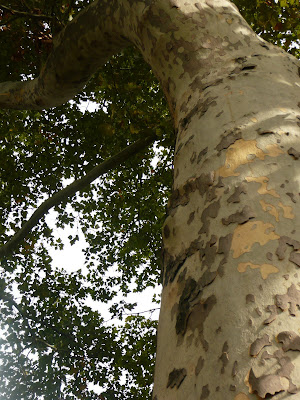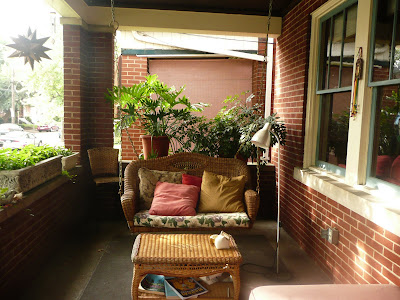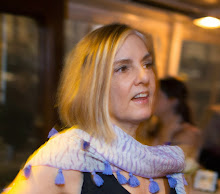Monday, May 16, 2011
La Muse: Labastide Onion Festival
Monday, July 12, 2010
Thinking about Form Part I
Tuesday, November 3, 2009
Writing the Shadow
Writing the Shadow:
the Persona and Dramatic Monologue Poem
I. Some Definitions:
Persona (from Merriam Webster)
1 : a character assumed by an author in a written work
2 a plural personas [New Latin, from Latin] : an individual's social facade or front that especially in the analytic psychology of C. G. Jung reflects the role in life the individual is playing
b : the personality that a person (as an actor or politician) projects in public (image).
--A single person, who is patently not the poet, utters the speech that makes up the whole of the poem, in a specific situation at a critical moment […].
--This person addresses and interacts with one or more other people; but we know of the auditors' presence, and what they say and do, only from clues in the discourse of the single speaker.
--The main principle controlling the poet's choice and formulation of what the lyric speaker says is to reveal to the reader, in a way that enhances its interest, the speaker's temperament and character.
Shadow
a. “The shadow is that part of us we fail to see or know. “ Owning Your Own Shadow: Understanding the Dark Side of the Psyche, Robert Johnson
b. The shadow is “the personification of certain aspects of the unconscious personality… which…is the dark, unlived, and repressed side of the ego complex. ” Shadow and Evil in Fairytales, Marie-Louise Von Franz.
II. Exploring your Shadow
What is the nature of the face you project to the world? What do you have to repress or hide in order to keep that face alive? Imagine you are Dr. Jekyl and Mr. Hyde. What would your Mr. Hyde be like? In the tale of Jekyl and Hyde, Jekyl was a doctor who saved live, and Hyde was a murderer who took lives. One could argue Hyde was Jekyl’s shadow. What might your shadow be? Write a draft of a poem that is written in the voice of your shadow. Do not use the word shadow and do not refer to yourself. This poem is writtenonly in the voice of the shadow. Give it a title at the end that makes it a person outside of yourself (see, for examples of titles, Ai and Christopher Davis persona poems).
See this poem by Ai for an idea of how to work place and other specific details into a shadow poem such that the character is brought alive:
The Hitchhiker (from Vice: New and Selected Poems, NY: Norton, 1999)
The Arizona wind dries out my nostrils
and the head of the sidewalk burns my shoes,
as a woman drives up slowly.
I get in, grinning at a face I do not like,
but I slide my arm across the top of the seat
and rest it lightly against her shoulder.
We turn off into the desert,
then I reach inside my pocket and touch the switchblade.
We stop, and as she moves closer to me, my hands ache,
but somehow, I get the blade into her chest.
I think a song: “Everybody needs somebody,
everybody needs somebody to love,”
as the black numerals 35 roll our of her right eye
inside one small tear.
Laughing, I snap my fingers. Rape, murder, I got you
in the sight of my gun.
My feet press down in it,
familiar with the hot, soft asphalt
that caresses them.
The sun slips down into its cradle behind the mountains
and it is hot, hotter than ever
and I like it.
Tuesday, September 22, 2009
Grass

 When we moved into our house four years ago there was already an established bed of fountain grass (Pennisetum, also known as Feathertop) growing close to the front porch. I planted another clump of it closer to the sidewalk because I love it so much. In late summer and into the fall it blooms, carrying spikes of fuzzy and feathery flowers that can double the size of the plant. I suppose it's called "fountain grass" because its structure is that of a fountain; the clump grows from a central area and the grass falls in a lovely curve outside of the center.
When we moved into our house four years ago there was already an established bed of fountain grass (Pennisetum, also known as Feathertop) growing close to the front porch. I planted another clump of it closer to the sidewalk because I love it so much. In late summer and into the fall it blooms, carrying spikes of fuzzy and feathery flowers that can double the size of the plant. I suppose it's called "fountain grass" because its structure is that of a fountain; the clump grows from a central area and the grass falls in a lovely curve outside of the center. Friday, September 11, 2009
Sycamore




Tuesday, September 8, 2009
My Front Porch

I've asked students in my Nature and Environmental Writing class to keep a blog about a special place, and I'm committed to doing that myself for the fall.
Friday, August 14, 2009
Paying Attention
Saturday, July 18, 2009
She dealt her pretty words like Blades
Friday, July 17, 2009
Wednesday, July 15, 2009
Jim Harrison

Emily Dickinson
 e
eTuesday, July 7, 2009
Osprey



Osprey nest from the Atchafalaya Basin. These are huge nests that can survive the kinds of winds most houses in Louisiana cannot. There's a juvenile in the nest who apparently can't yet fly. The mother tried to lure us away whenever we got close by flying over the water and dragging her foot as if she were hurt. Osprey are widespread over the world and are also known as sea hawks. They eat primarily fish, and usually nest in a very high tree (or telephone pole . . . . ). We saw this osprey nest in summer 2009, but we also saw the same nest, same parent birds the last time we visited. My friend Greg (google him: Greg Guirard) usually takes me to see this nest everytime we visit.
I've spent so much time at the Atchafalya, and have hardly written any poems about it although I've written quite a lot in Swamp Songs. Maybe a book of poems focused on that area would be a good project for me now. Starting with osprey.
Thursday, July 2, 2009
Missing
Wednesday, July 1, 2009
The Sage of Cups

The Sage or King of Cups in a tarot deck is an ambivalent figure, always hiding something. He usually represents someone in Art or Law. It is said that he is uncomfortable in his own suit--a water suit--because at base his soul is fiery. But though he's become a master of the suit of cups, he is always pretending. He could be a figure that has repressed his own dreams in order to succeed in the world materially. He's very good at what he does: advising others, healing disputes, directing others. He is the consummate diplomat, a respected leader, although he also has a fiery temper that sometimes surfaces.
Tuesday, June 23, 2009
Thursday, June 18, 2009
Finding Time and Strength to Write
Tuesday, June 16, 2009
Poetry
Friday, June 12, 2009
The Eight of Swords

Letting my Hair Go Gray

For the last year I have been letting my hair "grow out." No more highlights, no more trying to hide the fact that my beautiful brown hair is turning gray. While this decision has had a positive effect on my pocketbook (chemical hair treatments at a good salon can run $150 per treatment if you get a cut and style as well), it's not been easy.








